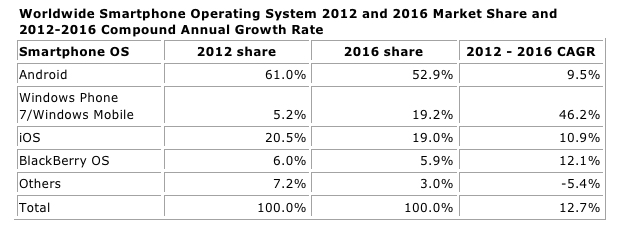IDC: Android will 'peak'; Will iOS hold on to second place?

In a two-horse race between Android and iOS at the top of the smartphone market share table, Research in Motion and Microsoft are left to fight for the highly coveted third-place.
According to new projections, Microsoft could see its share rise to place it not in third place --- but second place --- by 2016.

IDC warns the smartphone market will not be as "lively" in 2012 as it has on previous years as the transition between feature phones and smartphones continues.
But the research firm said today it expects Android to peak later this year ahead of a market slowdown in mobile phone shipments in the coming years.
Interestingly, in 2012 we are seeing a battle between first and second place, with the fallback third place in the market share rankings as the highly coveted spot among the lower players, in 2016 we will see Android reign as the king of mobile platforms, while second and third place will be the key mobile battleground.
Windows Phone will likely take the crown from BlackBerry, according to comScore figures, even though at the moment its share continues to fall --- though not as rapidly as RIM's.
But here's the kicker: these figures reflect only if Nokia can keep its head above the water.
iOS will likely suffer a small market share decline but will likely see an emerging markets offset if Apple wants to maintain and gain share. IDC is obviously talking about BRIC countries --- including Brazil, Russia, India, and China --- though expects Apple to see a significant overall shipment growth through to 2016.
BlackBerry, however, will likely slip into fourth place --- even though at this rate, considering RIM's current market troubles, the company may not live to see Christmas. RIM's move towards the emerging markets, such as India and Indonesia, will likely keep the company ticking over. Having said that, as the BYOD movement forms a natural trend in the coming years, the BlackBerry smartphone will fall behind.
It all rests on Nokia. If the Finnish phone giant can avoid "doing a RIM" and slipping into an operating loss, hopefully kept going by its Redmond-based partners, it may not challenge Android by a long shot but could keep Apple at bay.
Image credits: IDC.
Related:
- Samsung, Android held leads over U.S. mobile market in April
- RIM targets India, Indonesia in short-term revenue hit
- Android, Apple iOS run away from pack: Can Windows Phone challenge at all?
- Gartner: Samsung steals Nokia's crown as global phone leader
- Gartner: 60 percent of firms plan increase in staff social media snooping by 2015
- Smartphones: Commoditization looms; shakeout can't be far behind